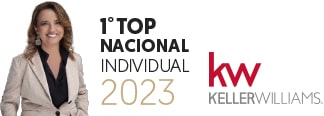The exclusivity regime proposed by some real estate companies, including Keller Williams - the company I work for - is usually one of the requirements that most shakes the owner when deciding on the best strategy to sell their home . However, what initially seems to be a disadvantage, signing an Exclusivity Contract, may not be , and the proof ends up coming to light over time.
First of all, it is important to dispel a frequent myth:
The fact that the owner signs an exclusive contract with a real estate agency does not mean that this (the mediation company) is prevented from sharing the sale or lease of his house with other competitors ! In other words, the exclusive concerns only the promotion of the property and not its sale!
Of course, not all real estate companies advocate sharing outside their network of consultants :
- There are real estate agents or consultants who deliberately or covertly discourage this work tool.
- There are real estate companies that impose sharing rules in an inequitable way. eg while KW Portugal defends sharing as one of its main assets and supports 50% / 50% sharing, whether between consultants in its network or involving consultants from other real estate companies, Remax Portugal , as an example, has recently created a rule 70% / 30% , for when the sharing takes place between consultants in your network and those of other real estate companies. This, in practice, discourages sharing, reduces the visibility of the property and restricts the range of potential buyers.
I must be one of the consultants that shares the most inside and outside the Keller Williams Portugal network and I consider this tool an advantageous working resource.Refusing to share would hurt the owners who trusted me .
The advantages of selling your home exclusively
These are some of the reasons why you should not be afraid to sign an exclusive contract with a real estate company to sell or rent your home:
![]() Commitment - The owner benefits from a greater dedication on the part of the consultant who works on an exclusive basis, contradicting the misconception that: if there are "n" competing consultants working in parallel on the same property, the probability of success is multiplied by "n". What experience ends up showing is that, after an initial peak of activity, after the conclusion of an "Open Contract", it decreases over time and the property tends to lose interest on the part of the consultants , who prefer to focus on properties that sell on an exclusive basis, to the detriment of those that are sold on an " open basis".
Commitment - The owner benefits from a greater dedication on the part of the consultant who works on an exclusive basis, contradicting the misconception that: if there are "n" competing consultants working in parallel on the same property, the probability of success is multiplied by "n". What experience ends up showing is that, after an initial peak of activity, after the conclusion of an "Open Contract", it decreases over time and the property tends to lose interest on the part of the consultants , who prefer to focus on properties that sell on an exclusive basis, to the detriment of those that are sold on an " open basis".
![]() The Risks - The sale of a house, contrary to what it may seem at first glance, is not a mere transaction identical to that of so many other commercial products. There are too many legal, fiscal and financial "traps" that can lead the owner to very complicated situations, even due to the high values at stake. Now, the role of an experienced real estate consultant, duly advised by a professional team, is to advise his client at all times to avoid unforeseen damages and losses.
The Risks - The sale of a house, contrary to what it may seem at first glance, is not a mere transaction identical to that of so many other commercial products. There are too many legal, fiscal and financial "traps" that can lead the owner to very complicated situations, even due to the high values at stake. Now, the role of an experienced real estate consultant, duly advised by a professional team, is to advise his client at all times to avoid unforeseen damages and losses.
![]() Marketing - When the broker offers you "non-exclusivity" as an advantage and simultaneously promises you to use powerful marketing in the service of marketing your property, he is not being completely truthful. Marketing these days has high costs, whether it's traditional marketing or digital marketing. Invest in social networks, in teams of professionals (photographers, audiovisual producers, marketers and designers, translators, etc.), in the best national and international advertising sites, etc. etc. It has costs, lots of costs. Exclusivity is the price to pay for increasing the visibility of your property without losing value and getting the best buyer for your home .
Marketing - When the broker offers you "non-exclusivity" as an advantage and simultaneously promises you to use powerful marketing in the service of marketing your property, he is not being completely truthful. Marketing these days has high costs, whether it's traditional marketing or digital marketing. Invest in social networks, in teams of professionals (photographers, audiovisual producers, marketers and designers, translators, etc.), in the best national and international advertising sites, etc. etc. It has costs, lots of costs. Exclusivity is the price to pay for increasing the visibility of your property without losing value and getting the best buyer for your home .
![]() Time - This is a variable that should contribute to the quality of the sale and not to a sale at any price. Would you trust a brain surgeon just because he promises to perform the operation faster? Or a shop mechanic? Or a builder of a house? Obviously not! You're afraid of what might happen in the end, right? Selling a home is no different. Risking your home in a fierce competition between consultants, devaluing your property not to mention the frustration that awaits you, doesn't seem like such a good idea, does it? All this to "escape" an exclusivity contract, whose usual duration is only 6 months!!
Time - This is a variable that should contribute to the quality of the sale and not to a sale at any price. Would you trust a brain surgeon just because he promises to perform the operation faster? Or a shop mechanic? Or a builder of a house? Obviously not! You're afraid of what might happen in the end, right? Selling a home is no different. Risking your home in a fierce competition between consultants, devaluing your property not to mention the frustration that awaits you, doesn't seem like such a good idea, does it? All this to "escape" an exclusivity contract, whose usual duration is only 6 months!!
![]() Focus - For the consultant, the exclusivity regime means that he has time to develop a professional job. Its focus is no longer centered on competition with other consultants and is now focused on promoting and finding the best buyer for your home, that is, "the one who is willing to buy your property at the highest price and the purchase in the shortest period of time" . The consultant, instead of fighting against time, starts to fight for the appreciation of his property, because both parties have more to gain from it.
Focus - For the consultant, the exclusivity regime means that he has time to develop a professional job. Its focus is no longer centered on competition with other consultants and is now focused on promoting and finding the best buyer for your home, that is, "the one who is willing to buy your property at the highest price and the purchase in the shortest period of time" . The consultant, instead of fighting against time, starts to fight for the appreciation of his property, because both parties have more to gain from it.
![]() Confidentiality - This issue is not always sufficiently considered by homeowners who want to preserve the confidentiality of the process of selling their home. It is easy to see that, if this is an important factor for you, by opting for non-exclusivity you are taking the opposite path to the intended one. An experienced consultant, who has enough time, may be able to sell his house, will have the time and the additional stimulus to explore his network of contacts and find a buyer, even without resorting to the unruly publicity that the competition between several brokers would bring him for right.
Confidentiality - This issue is not always sufficiently considered by homeowners who want to preserve the confidentiality of the process of selling their home. It is easy to see that, if this is an important factor for you, by opting for non-exclusivity you are taking the opposite path to the intended one. An experienced consultant, who has enough time, may be able to sell his house, will have the time and the additional stimulus to explore his network of contacts and find a buyer, even without resorting to the unruly publicity that the competition between several brokers would bring him for right.
![]() Sharing - One of the ways to increase the visibility of a property and to reach qualified customers is through sharing between the real estate consultant and the other colleagues in his work network, or from other real estate companies. When there is an Exclusivity Agreement, the consultant is more comfortable with disclosing it, because he is guaranteed at least 50% of the business during the contractual period. But when the promotion is carried out under an Open Contract, this does not happen, for fear of the consultant losing the business to the competition , which makes it difficult to promote the property and the subsequent sale.
Sharing - One of the ways to increase the visibility of a property and to reach qualified customers is through sharing between the real estate consultant and the other colleagues in his work network, or from other real estate companies. When there is an Exclusivity Agreement, the consultant is more comfortable with disclosing it, because he is guaranteed at least 50% of the business during the contractual period. But when the promotion is carried out under an Open Contract, this does not happen, for fear of the consultant losing the business to the competition , which makes it difficult to promote the property and the subsequent sale.
![]() Devaluation - When a property comes up for sale, still "virgin" on the market, it provokes interest and curiosity, this because few people know about it, keeping its "aura of appreciation" intact. A property promoted by several brokers, where each one of them uses descriptions, characteristics and photos of dubious quality, sometimes even with an outdated price, after some time, acquires the image of " property that nobody wants to buy and that will probably have some problem ".
Devaluation - When a property comes up for sale, still "virgin" on the market, it provokes interest and curiosity, this because few people know about it, keeping its "aura of appreciation" intact. A property promoted by several brokers, where each one of them uses descriptions, characteristics and photos of dubious quality, sometimes even with an outdated price, after some time, acquires the image of " property that nobody wants to buy and that will probably have some problem ".
These are just some of the arguments that confirm the old saying: "quickly and well!" .
But to maintain impartiality in approaching this controversial issue, I will assume the role of "devil's advocate":
The Disadvantages of Selling Your Home Exclusively

- The first major disadvantage, often mentioned, is: if the real estate agent chosen is not up to the challenge and does a poor job of promotion or mediation, the owner "will be stuck" with that bad choice for the entire duration of the exclusivity contract. This prospect scares many homeowners and is one of the reasons that leads them to "play it safe" and instead bet on an "open regime", with several real estate companies competing simultaneously. Thus, they think: if one of the consultants fails, there is a possibility that another one will do a good job . Is this reason enough to nullify the above mentioned disadvantages?What I usually answer in relation to this objection is that: never choose a real estate consultant based on the suggestion of a friend or acquaintance , or for reasons of family proximity, without having proof that this professional is one of the best in the area of your property , or at the real estate agency you represent. Try to find out about: the highlights of your career, how long you've been working in this activity, the number and quality of properties that are part of your fundraising portfolio and whether you raise exclusively or not. A consultant who raises on an exclusive basis and deserves the trust of many owners, is a good indication of its possible merit.
My record is easy to consult: properties that are currently part of my promotion portfolio and some highlights of my real estate career, which is only 6 years old. - Another disadvantage often referred to is that " 6 months is a long time to be tied down to an exclusive relationship with a realtor ". Of course, six months can be a long time if the consultant is unable to sell his house, or it can be an acceptable amount of time if he is successful. Here the main question is divided into two:
- Is the property being sold at an adjusted market price, or slightly above?
- What financial investment does the consultant intend to dedicate to the promotion of your property ?
If you answered yes to the first question, it is up to you to ask the second question to the consultant, before signing an exclusivity contract. Either the value proposition is clear and stronger than the competition, or the exclusivity may not be worth it. - A consultant or a real estate agency, after signing the exclusivity contract, "relax, because the owner is already attached to him" . The stimulus and the desire to please quickly fade, because now you don't need to prove anything right away. You have 6 months to reach the sale goal, so you can dedicate yourself to raising other properties, in a typical strategy of "raising a lot, to sell something". It is true that this risk exists and it is not a false question. Many professionals look at the number of properties listed as a strategy, because they know what statistics tell them: "if you find X properties, you have Y probability of selling something" . For these consultants, the most important thing is not each property in particular, but the number of properties in their portfolio. For me, each property is as important as the others and deserves the same investment.
- The real estate companies that demand exclusivity, almost all charge a 5% commission on the sale value of a house and that's a lot! I prefer to work with a smaller agency, which, for not working exclusively, charges lower commissions! It is true. Most real estate agencies that work exclusively charge 5%, although this is not always the case. If it is a project composed of several fractions, or a property whose sale value is greater than €750,000, it is normal to negotiate lower commission values. However, the question you should ask is another: what is more important to you, the revenue you want to raise from the sale of your property, or how much can the real estate company earn?
If a consultant does a good job of promoting and negotiating and is able to sell your home faster and for a higher price than others (including you) then why not pay for their work?I have often seen this dilemma. Owners looking to pay as little as possible to realtors, or ideally pay nothing and try to sell it themselves. Often, in the end, they end up accepting lower purchase offers, due to the lack of interested buyers. Furthermore, many do not even know that the commission paid to a real estate consultant (including VAT) is fully deductible in capital gains and in the IRS tax that you will have to pay on them. It's your choice... - Most exclusivity contracts do not allow the owner(s) to sell the home by their own means, ie alone. eg if a friend or acquaintance makes a direct proposal to the owner, the real estate company will not waive the commission on the sale value. It is true. When the real estate company establishes an Exclusivity Contract, it is obliged to increase its investment in the promotion of the property and dedicate more resources to this objective , namely human resources.However, she knows that the owner will be inclined to accept a lower offer and not pay commission on the sale if it is an open option. Basically, this is a restriction justified by mutual trust: the owner gives the consultant time to prove that his value proposition is real and deserves to be paid, and in return he receives dedication, a lot of work and a strong investment in the promotion of his property. .
It is a fair relationship, as long as the assumptions are met and it deserves to be rewarded, as long as the results prove to be superior to those of the "open regime" or "sale by independent means" option.
In short: my advice is not to be afraid of an exclusivity contract! Six months is not an eternity, but an opportunity for a proven professional to improve the chances of selling your home well and in the shortest possible time.



